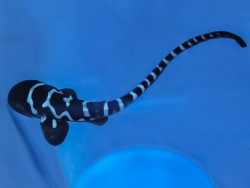Primorsky Aquarium welcomes a baby zebra shark

On August 25, a happy event occurred when Alpha, the first aquarium-bred zebra shark in Russia, got a baby sibling. The hatchling measured 27 centimeters and weighed 35 grams. A name for the new addition to the Aquarium family has not been chosen yet. The major task ahead of aquarists now is to allow the young to adjust to external feeding after a long period of yolk nutrition.
The arrival of the baby shark in late August was a pleasant surprise for the Primorsky Aquarium. Since in zebra sharks incubation typically takes about six months, the eggs deposited in the latter half of March were expected to hatch towards the end of September. However, the young turned out to be a hearty eater who made away with a food reserve located in the egg case and went free swimming.
Artyom Novikov, biologist, specialist of the Primorsky Aquarium, said,
“The egg case was totally empty, meaning that the baby had hatched because it had fully consumed the yolk sac. It should be mentioned that zebra sharks grow relatively quickly. Alpha, our first born shark, was the same length as her sibling after hatching, 27 cm. In a year, she increased in size by one meter.”
Despite the fact that the hatchlings of these sharks can use the yolk sac’s nutrients for up to a month and only after that switch to external feeding, the young started taking food on the second day. It preferred squids and salmon to other fish or seafood. Now the baby is lively and active, quickly adapts to its tank being carefully monitored by our aquarists.
Its big sister Alpha will celebrate her second birthday in as soon as a month. She is the first successfully captive bred zebra shark in Russia. By observing the growth and development of Alpha, biologists managed to collect unique research data. Careful observations of its dietary habits and measurements of its growth starting from the early stages let them develop practical guidance on the reproduction and husbandry of sharks, which is important for further work on breeding programs for endangered species.
Visitors can meet the parents of Alpha and her younger sibling in the Oceanic Abyss, the largest tank at the Primorsky Aquarium.